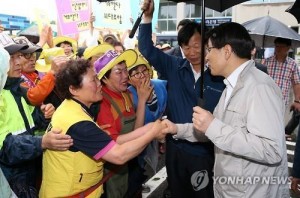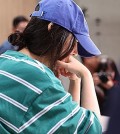- California Assembly OKs highest minimum wage in nation
- S. Korea unveils first graphic cigarette warnings
- US joins with South Korea, Japan in bid to deter North Korea
- LPGA golfer Chun In-gee finally back in action
- S. Korea won’t be top seed in final World Cup qualification round
- US men’s soccer misses 2nd straight Olympics
- US back on track in qualifying with 4-0 win over Guatemala
- High-intensity workout injuries spawn cottage industry
- CDC expands range of Zika mosquitoes into parts of Northeast
- Who knew? ‘The Walking Dead’ is helping families connect
S. Korea reports 2 more deaths from MERS, fatality rate at 17.1%

South Korean Prime Minister Hwang Kyo-ahn speaks with shop owners and visitors at a fish market in Seoul on June 26, 2015, as the government has struggled to keep the local economy afloat amid the outbreak of Middle East Respiratory Syndrome. (Yonhap)
SEJONG, June 26 (Yonhap) — South Korea reported an additional two deaths from Middle East Respiratory Syndrome (MERS) Friday, along with a new case that put the total number of people diagnosed with the disease at 181.
The newest patient was a doctor from Seoul’s Samsung Medical Center, which has accounted for nearly half of all infections here, according to the Ministry of Health and Welfare.
The hospital, run by the country’s largest conglomerate Samsung Group, had voluntarily shut down most of its operations until Wednesday. The shutdown has been extended indefinitely by the health ministry as patients and doctors, as well as simple visitors to the hospital, continued to be diagnosed with the disease.
The two new deceased were both female patients, aged 79 years and 80 years old, and both of whom had existing health conditions, including diabetes, cerebral infarction and cancer.
The health ministry has said over 90 percent of all MERS-related deaths in South Korea have involved people with existing health conditions, which were apparently worsened by MERS, eventually leading to their deaths.
With the latest fatalities, the country’s death toll came to 31. The fatality rate of the disease in the country rose to 17.1 percent.
Out of the 181 people diagnosed with the potentially deadly disease so far, 81 have been discharged from hospitals following complete recoveries, according to the ministry.
The remaining 69 remain hospitalized with 13 of them currently in critical condition.
Apart from those diagnosed, 2,931 people were in isolation for possible infection after coming in close contact with MERS patients. The number increased from 2,642 on the previous day.
Since the country reported its first case of MERS on May 20, some 15,000 people have been subject to isolation as suspected cases. Over 12,000 have since been released after they showed no symptoms of MERS for more than the known maximum incubation period of 14 days for the disease.
So far, nearly all infections have occurred at hospitals with possibly the only exception involving an ambulance driver and a paramedic who helped transport MERS patients.
A list of hospitals affected by MERS is daily updated and available on the ministry’s website.
The government earlier refused to identify MERS-affected hospitals, partly due to legal considerations over possible damage to private institutes, but the decision has been blamed for the spread of the disease as people, lacking such information, continued to visit MERS-affected hospitals.
From the Samsung hospital alone, the country reported 86 cases of the disease as of Thursday.
To ensure availability of such necessary information, the National Assembly passed a revision to the related law late Thursday that allows immediate disclosure of people and medical institutes affected by infectious diseases, as well as any public places or means of public transportation visited or used by infected people.
Also following the enactment of the revised law, those who give false statements regarding the source of their infectious disease may be punished by up to two years in prison or a maximum fine of 20 million won from the current 2 million won.
The measure comes after a female MERS patient, prior to her diagnosis, had lied about having visited a known MERS-affected hospital while seeking treatment at another hospital, causing the medical staff there to put down their guard and thus eventually exposing tens, if not hundreds, of other people to the disease.
Meanwhile, the government said it will provide up to 10 million won (US$8,953) for each of those who died of MERS to help pay for their funeral services.
MERS is a viral respiratory disease that was first reported in Saudi Arabia in 2012. The disease had carried a very high fatality rate of over 40 percent until the outbreak here as there currently is no vaccine or treatment for the disease.















